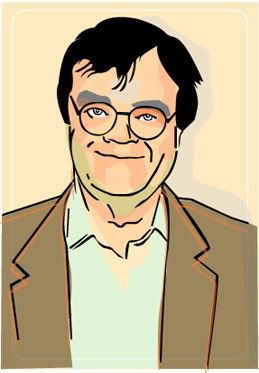By Garrison Keillor
July 23, 2008 |
New York in July, hot and breezy, the smell of pizza and coffee in the air, and on the subway one is surrounded by women in light summer dresses, the bare shoulders of elegant young urban women whose shoulders tell you they never toted barges or lifted bales, never laid eyes on a barge or a bale except for someone barging into their office and giving them a baleful look. They are swanning along through their 20s and I love to look at them while observing the No Staring rule, five seconds max -- but five seconds of a beautiful New York woman burns an image on your retina that will see you through the miseries of the city.
Such as Penn Station, America's ugliest waiting area, made uglier by Amtrak's infernal blockheadedness. It is a lovely thought, passenger
 rail service, but Amtrak has an uncanny ability to take a few hundred ordinary Americans and make them feel like refugees. One moment you're in New York, 2008, and the next you're in Warsaw, 1939, trying to squeeze aboard the last train to Sweden. Passengers crowding into stairways, elbowing each other to find seats for which they've paid a pretty penny -- it's as if online reservations hadn't been invented yet.
rail service, but Amtrak has an uncanny ability to take a few hundred ordinary Americans and make them feel like refugees. One moment you're in New York, 2008, and the next you're in Warsaw, 1939, trying to squeeze aboard the last train to Sweden. Passengers crowding into stairways, elbowing each other to find seats for which they've paid a pretty penny -- it's as if online reservations hadn't been invented yet.By comparison, the subway is rather civilized. In the L train station at Eighth Avenue an LED display tells you the next train to Brooklyn will leave in eight minutes and, lo and behold, it does. This is a huge advance in the history of American mass transit. The relief of the station-platform blues --
Oh how long how long must I stand and wait?
My baby is in Brooklyn and I cannot, no I cannot be late.
This is civility -- among all the pushing and shoving of this rough life, someone has gone and done something for the common good and made things a little better than they need to be. You see this in a city that is loved by its citizens. Decorative stonework on a shop front, potted geraniums on a front stoop, swept sidewalks. A kid with a guitar sings "I Saw Her Standing There" in the subway station, and it's so much better than you expect a busker to sound.
My urologist gives me a long learned lecture on the prostate of which I cannot now recall a single thought, only remember the honor of being treated as an intellectual equal. To me, this is the wonder of city life -- I find so much that exceeds my provincial expectations, a dreamy scene in an opera memorable for months, a chance encounter on the street. At the moment I'm engrossed in a book by Julian Barnes, a city man through and through, that is so good I keep putting it down so I won't read it too fast.
I slipped into Central Park around 11 the other night and sat on a bench near the Sheep Meadow and watched a few runners jouncing along, some horse-drawn carriages clip-clopping by. A couple necking in the shadows. And the whole dark paradise ringed by thousands of lights on the various upright planes of apartment buildings. A peaceful and profound place at night where you imagine you might discover the elusive secret of your life (you're a writer because you're lazy and you don't get along with people), or maybe God would sit down next to you and confess his own doubts as to his existence, but almost nobody goes there because it feels unsafe because almost nobody goes there. Why does a great city surrender this beautiful turf to predators real or imagined?
And why should you and I surrender our beloved country to the predators who've plundered our sacred institutions in the name of conservatism? We have come to accept torture as American policy, accept the prison state and the loss of civil liberties, accept the privatization of public service, one blow to civility after another. We read about it in the paper, shake our heads and move on, as Americans do: Someone steals your car one night, you take the bus to work, you don't sit home and brood over it.
In a democracy, however, it is possible to take a sharp turn, whoosh, and in one majestic moment, the bums are thrown out, the cronies of cronies who rigged the system and the bulbous blowhards wrapped in Old Glory and nihilists in golf pants -- they have to sell their Washington condos and move on and find some other line of work. Glory, hallelujah, the truth is marching on.
Source: Salon.com

No comments:
Post a Comment